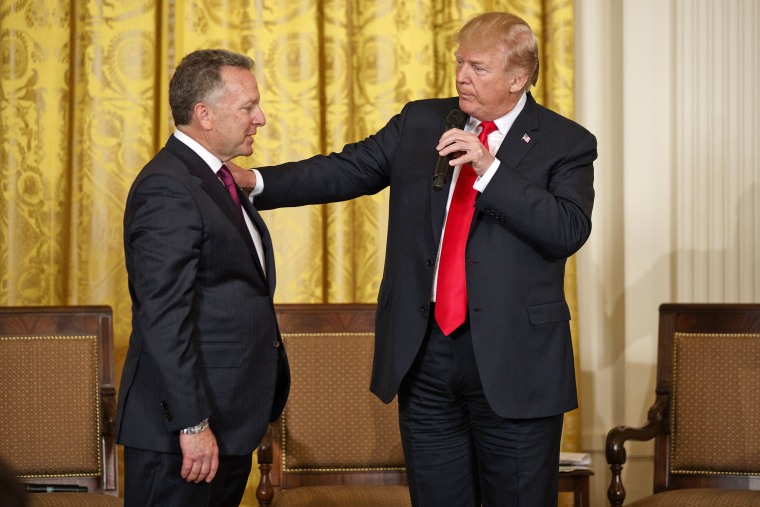President Donald Trump is set to roll out new plans to tackle the nation’s opioid crisis on Monday that are expected to call for tougher penalties, potentially including the death penalty for traffickers, a senior White House official told NBC News.
In addition, the president is expected to propose changes in the areas of treatment and recovery for those dependent on opioids, focusing on substance abuse prevention and education efforts.
On Monday, Trump will be surrounded by members of his cabinet as he announces the plan in a state that is one of the hardest hit by the opioid epidemic — New Hampshire, which had the third highest drug overdose in the nation in 2016.
“We have $6 billion in short term funding to work with," the senior official said, referring to the amount Congress has set aside in the budget agreement for the next two years. The president's plan will outline how the president thinks that money should be spent.
The official said part of the plan is expected to focus on efforts to help those who recover from substance abuse find employment and long-term help, efforts that will be aided by the Department of Labor. The plan may also involve the Department of Education, the Department of Housing and Urban Development, the State Department, Department of Justice, Health and Human Services, the Department of Homeland Security and the Veterans Affairs Administration.
For months, the president has also been talking about stricter penalties for drug offenders. On Saturday at a political rally in Pennsylvania, Trump said allowing the death penalty for drug dealers is “a discussion we have to start thinking about.”
“If somebody goes and shoots somebody, or kills somebody, they go away for life and they can even get the death penalty, right? One person. They shoot one person, they get the death penalty,” the president said. “A drug dealer will kill 2,000, 3,000, 5,000 people during the course of his or her life. Thousands of people are killed or their lives are destroyed, their families are destroyed. So you can kill thousands of people and go to jail for 30 days. They catch a drug dealer, they don’t even put them in jail.”
The White House official said the president is interested in a successful model in Singapore, and emphasized that Singapore’s methods are not just about enforcement but also include early intervention in schools and programs to help those in recovery assimilate back into the community.
In his speech Saturday, Trump relayed to a conversation with the leader of Singapore who said that nation doesn't have a drug policy because of its "zero tolerance policy." When he asked what that policy meant, Trump said he was told, "That means if we catch a drug dealer, death penalty.”
The president also cited China as a model to follow.
Both China and Singapore have been criticized by human rights organizations for their enforcement policies.
Retired Gen. Barry McCaffrey, who served as the director of the Office of National Drug Control Policy, said the idea of imposing the death penalty on drug traffickers is “an empty gesture not suitable for our great country.”
It would take an act of Congress to approve the death penalty for federal drug offenses.
The senior White House official said the administration wants to work with Congress to change existing laws that tie punishment to the amounts of drugs in possession. As the opioid Fentanyl has gained popularity on the street, the official says, laws have not kept up. “A drug dealer can have 20,000 lethal doses of Fentanyl and not trigger mandatory minimums sentences,” the official said.
The opioid plan is the brainchild of senior White House adviser Kellyanne Conway, who has been holding regular White House meetings on the subject. Conway has referred to the working group as an “opioid cabinet.”
The Office of National Drug Control Policy is the executive branch agency that was created in 1986 to handle drug policy. Trump recently nominated a new director, Jim Carroll. A spokesman for the agency said Carroll had been briefed on the details of the opioid plan.
CORRECTION (March 16, 2018, 5 p.m.): An earlier version of this article misidentified the current acting director of the Office of National Drug Control Policy. It is Jim Carroll, not Richard Baum.
